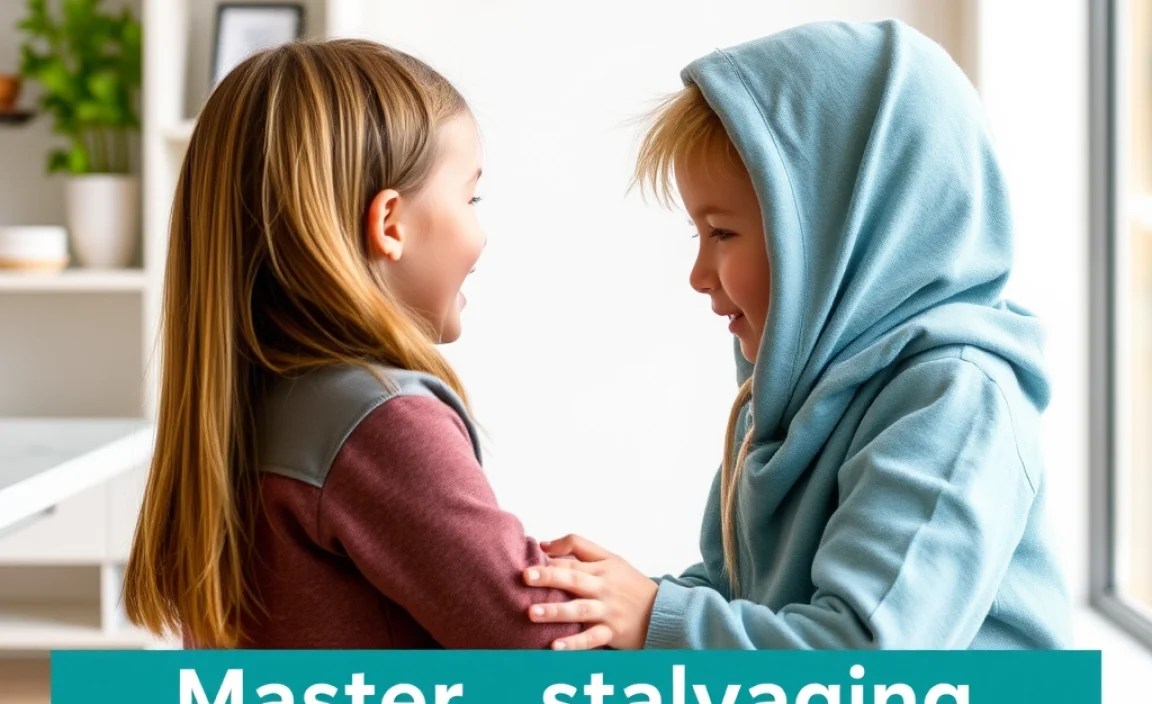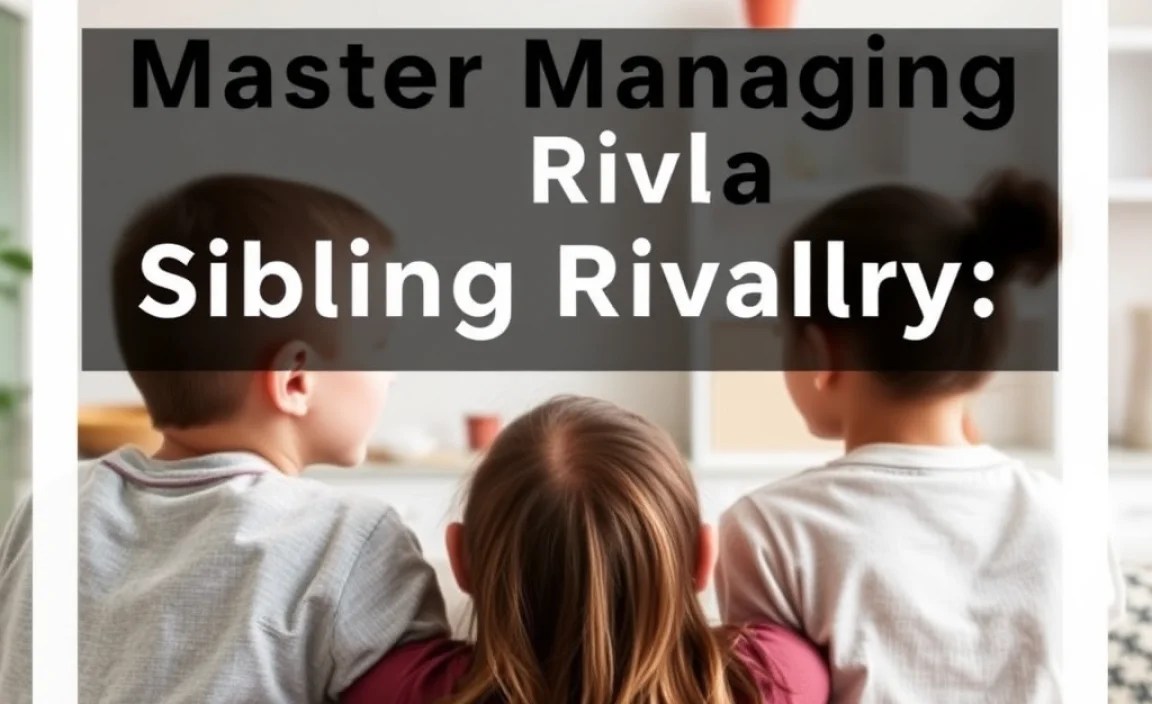Have you ever wondered why siblings fight so much? It can feel like a daily battle. But what if I told you there’s a way to bring peace to your home? Managing sibling rivalry can turn arguments into teamwork. Let’s explore how to make that happen!
At A Glance
Key Takeaways
- Managing sibling rivalry brings more peace to your home.
- Communication is a key tool for solving fights.
- Set rules to guide and reduce conflicts.
- Encourage team activities to build bonding.
- Praise positive interactions to reinforce good behavior.
Understanding Sibling Rivalry

Sibling rivalry happens when brothers and sisters argue or compete. This is normal, but it can become stressful. Kids often fight over toys, attention, or fairness. Parents can help by understanding why these fights happen. Sibling rivalry is not always bad. It can help kids learn to solve problems. But too much fighting can cause stress in the family. Let’s explore why siblings fight and what you can do.
- Fighting over toys is common.
- Kids seek attention from parents.
- Feelings of jealousy can arise.
- Competition can lead to arguments.
- Kids may copy each other’s behavior.
Parents play a big role in helping kids get along. By understanding the causes of rivalry, they can address it better. Each child is different and has unique needs. Meeting these needs can reduce fights. When kids feel heard and valued, they might fight less. Families who work together can turn rivalry into teamwork.
Fun Fact or Stats : About 80% of kids in the US have siblings!
Why Do Kids Fight?
Kids fight for many reasons. They might feel jealous if a parent gives more attention to one child. Imagine if your brother got a bigger slice of cake! How would you feel? Sometimes, kids just want what the other one has. It’s like playing a fun game where everyone wants to win. Understanding these reasons can help manage sibling rivalry better.
Is Rivalry Always Bad?
Not all rivalry is bad. Some fights help kids learn to share or solve problems. Think of it like a game. Sometimes, players argue but learn to play better. Parents can guide kids through these arguments. They can teach them to listen and be fair. This way, kids learn valuable skills from their rivalry.
Can Parents Stop Rivalry?
Parents can’t stop all rivalry, but they can reduce it. They can set rules to guide behavior. Imagine a game without rules. It would be chaos! Rules help kids know what’s fair. Parents can also praise good behavior. This makes kids feel proud and want to behave well. By setting a good example, parents help siblings get along better.
Effective Communication Tips

Communication is key to solving fights between siblings. When kids learn to talk about their feelings, arguments become less frequent. Teaching kids how to express emotions can make a big difference. It’s important for kids to listen to each other too. Listening shows respect and helps them understand one another. Let’s see how communication can change rivalry.
- Teach kids to say how they feel.
- Encourage kids to listen before reacting.
- Use “I feel” statements to express emotions.
- Create a safe space for sharing feelings.
- Practice active listening with your children.
Good communication helps kids deal with their emotions better. It teaches them to resolve conflicts peacefully. When kids feel heard, they’re less likely to fight. Encouraging open discussions can create a supportive environment. This makes managing sibling rivalry much easier. Through talking and listening, siblings can build stronger bonds.
Fun Fact or Stats : Families who communicate well have fewer conflicts!
Why Is Listening Important?
Have you ever tried talking when no one listened? It feels frustrating. This is why listening is crucial. When kids listen, they show they care. They learn what their sibling wants or feels. This understanding can stop many fights. Listening is like a superpower that calms storms and builds friendships.
How Can Parents Teach Communication?
Parents can teach communication by setting examples. When parents talk calmly, kids learn to do the same. They can also practice role-playing games. Imagine pretending you’re a superhero solving problems. It’s fun and educational! These games teach kids to use words, not fists, to solve issues. Communication becomes a family habit!
What’s the Role of Emotions?
Emotions play a big role in sibling rivalry. When kids feel upset, they might lash out. Teaching kids to name their feelings helps. Imagine a world where everyone knows exactly how they feel. It would be easier to solve problems! Kids learn to say “I’m angry” instead of fighting. This helps reduce conflicts and builds empathy.
Setting House Rules

House rules can guide kids’ behavior and reduce sibling rivalry. Rules create a clear structure for what’s acceptable. They help kids know what’s expected of them. Parents can sit with their children to decide on rules together. This way, everyone feels involved and respected. Let’s explore how setting rules can bring peace.
- Create rules with your kids for better acceptance.
- Keep rules simple and easy to follow.
- Ensure rules are fair for all siblings.
- Use visual aids to remind kids of rules.
- Review and update rules regularly.
Setting house rules can be a fun family activity. When kids help create rules, they understand their importance. This increases the chances they’ll follow them. Rules should be clear and concise. Visual aids like charts can help remind kids. Consistently following these rules fosters a peaceful home environment.
Fun Fact or Stats : Families with clear rules report fewer sibling fights!
Why Involve Kids in Rule-Making?
Involving kids in rule-making gives them ownership. When kids create rules, they feel more responsible. Imagine playing a game you helped invent. Wouldn’t you want to follow the rules better? This sense of involvement makes kids value the rules more. They understand why certain behaviors are necessary for harmony.
What Makes Good House Rules?
Good house rules are simple, clear, and fair. They should be easy for kids to understand. For example, “No hitting” is clear and direct. Rules should also apply to all siblings equally. This prevents feelings of favoritism. Kids are more likely to follow rules they see as fair. Fair rules help in managing sibling rivalry effectively.
How to Remind Kids About Rules?
Reminders help kids remember and follow the rules. Visual aids like charts or sticky notes are useful. Imagine a colorful chart on the fridge. It’s hard to miss! These constant reminders make rules a part of daily life. When kids see them often, rules become habits. This reduces the chances of rivalry and increases understanding.
Encouraging Team Activities

Team activities can help siblings bond and reduce rivalry. When kids work together, they learn to appreciate each other’s strengths. Activities like games, sports, or projects can foster teamwork. These activities teach kids to communicate and cooperate. Let’s explore how team activities can transform sibling rivalry into fun and learning.
- Choose activities that suit all siblings.
- Encourage cooperation, not competition.
- Include activities that require teamwork.
- Rotate leadership roles among siblings.
- Celebrate team successes with rewards.
Team activities bring siblings closer. They learn to solve problems together and support each other. When kids work as a team, they see each other as allies. This reduces rivalry and encourages positive interactions. Celebrating their successes together strengthens their bond. Team activities can be a powerful tool in managing sibling rivalry.
Fun Fact or Stats : 75% of kids prefer teamwork over solo activities!
What Are Good Team Activities?
Good team activities are those that all siblings enjoy. They should be fun and engaging. Imagine building a fort together. It’s exciting and requires cooperation! Board games, sports, and art projects are also great. These activities teach kids to work together and value each other’s contributions.
Why Rotate Leadership Roles?
Rotating leadership roles gives each child a chance to lead. This builds confidence and respect. Imagine leading a treasure hunt one day and following the next. Kids learn both roles are important. Leadership rotation teaches kids to listen and respect different perspectives. It reduces competition and enhances collaboration.
How Can Success Be Celebrated?
Celebrating success makes team activities rewarding. Parents can use simple rewards like extra playtime or treats. Imagine a small party for completing a puzzle together. Recognizing achievements encourages kids to work well together. It builds a positive association with teamwork and reduces rivalry. Celebrations make team activities memorable and fun.
Praising Positive Interactions

Praising positive interactions reinforces good behavior in siblings. When kids receive praise for getting along, they feel encouraged to continue. Positive reinforcement can be more effective than punishment. It helps kids focus on the good rather than the bad. Let’s see how praising can transform sibling relationships.
- Notice and praise even small positive interactions.
- Be specific about what you are praising.
- Encourage kids to praise each other.
- Use praise more than criticism.
- Make praise genuine and heartfelt.
Praising siblings for positive interactions builds a positive home environment. It shows kids the value of kindness and cooperation. Specific praise helps them understand exactly what behavior is appreciated. Encouraging siblings to praise each other strengthens their bond. Praise, when used effectively, can reduce sibling rivalry and promote harmony.
Fun Fact or Stats : 90% of parents find praise improves sibling relationships!
Why Is Specific Praise Important?
Specific praise helps kids know exactly what they did right. Imagine hearing “Great job sharing your toys!” instead of just “Good job.” Specific praise highlights the positive behavior. It motivates kids to repeat those actions. This clarity helps kids understand expectations and encourages positive interactions.
How Often Should Praise Be Given?
Praise should be given often, but it should be genuine. Overpraising can make it less meaningful. Imagine getting a trophy every time you tie your shoes. It would lose value. Genuine praise is more meaningful and effective. It encourages kids to continue positive behavior without relying on constant approval.
Can Kids Praise Each Other?
Yes, kids can learn to praise each other. Encouraging this builds mutual respect and appreciation. Imagine siblings saying “Great job!” to each other. It feels good to be recognized. When kids praise each other, it strengthens their bond and reduces conflicts. This positive environment makes managing sibling rivalry easier.
Conclusion
Managing sibling rivalry is possible with the right tools. Understanding the causes helps parents guide their kids. Communication, rules, teamwork, and praise are key strategies. They transform competition into cooperation. By using these tips, families can enjoy more peace and harmony. Remember, every small step counts toward building better sibling relationships.
FAQs
Question: What is sibling rivalry?
Answer: Sibling rivalry is when brothers and sisters argue or compete. It’s normal but can cause stress. Managing sibling rivalry helps families find peace.
Question: How can communication help?
Answer: Good communication helps siblings express feelings without fighting. It teaches them to listen and understand each other. This reduces conflicts and improves their relationship.
Question: Why are house rules important?
Answer: House rules provide a clear guide for acceptable behavior. They help children understand expectations. Rules reduce conflicts and foster a peaceful home environment.
Question: What are some good team activities?
Answer: Great team activities include sports, board games, and art projects. These encourage siblings to work together. They learn cooperation, which reduces rivalry.
Question: How does praise affect sibling relationships?
Answer: Praise reinforces positive behavior. It encourages siblings to be kind and cooperative. Positive interactions are praised, reducing rivalry and building a supportive environment.
Question: Can parents stop all sibling rivalry?
Answer: Parents can’t stop all rivalry, but they can reduce it. Understanding, communication, rules, teamwork, and praise help manage sibling rivalry effectively. These tools promote peace and harmony.